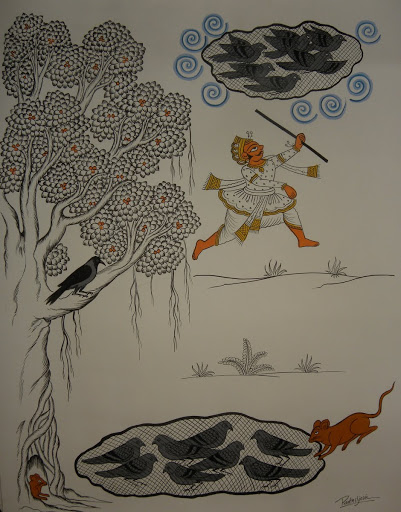Karataka said- “Then, what do you want to do now?”

Damanaka said- “At present, our king Pingalaka is very scared, and so are his advisers. So, first let’s approach him and find out the cause of his fear and choose one among the six ways of diplomacy (alliance, war, escape, remain secure at one’s place, take help from others and double dealing) , to act accordingly.
Karataka said- “How do you know that the king is frightened?” Damanaka replied- “What is there to know? It is said…”
उदीरितो ऽर्थः पशुनापि गृहते हयाश् च नागाश् च वहन्ति चोदिताः ।
अनुक्तम् अप्य् ऊहति पण्डितो जनः परेङ्गित-ज्ञान-फ्जला हि बुद्धयः ॥ ४४ ॥
udīrito ‘rthaḥ paśunāpi gṛhate hayāś ca nāgāś ca vahanti coditāḥ |
anuktam apy ūhati paṇḍito janaḥ pareṅgita-jñāna-phjalā hi buddhayaḥ || 44 ||
Even animals can sort of make out the meanings of the words uttered. Horses and elephants do as directed. Learned men can even understand the meaning of words not spoken aloud. True intelligence lies in understanding the subtle indications made by others.
आकारैर् इङ्गितैर् गत्या चेष्टया भाषणेन च ।
नेत्र-वक्त्र-विकारैश् च लक्ष्यतेऽन्तर्गतं मनः ॥ ४५ ॥
sākārair iṅgitair gatyā ceṣṭayā bhāṣaṇena ca |
netra-vaktra-vikāraiś ca lakṣyate’ntargataṃ manaḥ || 45 ||
It is easy to read the minds of others by observing their appearance, gait, action, speech and the changes observed in their eyes and facial expressions.
Therefore, I will approach the frightened king, understand the cause of his fear, and use my intelligence to remove this fear that he has, thus bringing him under my control. And in this way, I will also regain the post of his minister!”
Karataka said-“But you do not know anything about serving a superior. How can you bring him under your control?”
Damanaka said- “What do you mean by saying that I do not know the science of serving my superiors? When I was a child playing on the lap of my father, I chanced to hear the words of learned men who used to visit our house. They used to discuss the science of ethics and administration with each other. I heard a lot about the science of service and I still have that knowledge with me. It is said…”
सुवर्ण-पुष्पितां पृथ्वीं विचिन्वन्ति नरास् त्रयः ।
शूरश् च कृत-विद्यश् च यश् च जानाति सेवितुम् ॥ ४६ ॥
suvarṇa-puṣpitāṃ pṛthvīṃ vicinvanti narās trayaḥ |
śūraś ca kṛta-vidyaś ca yaś ca jānāti sevitum || 46 ||
These three categories of people alone can own this bountiful earth – the brave, the learned and the ones who are adept in the art of service.
सा सेवा या प्रभु-हिता ग्राह्या वाक्य-विशेषतः ।
आश्रयेत् पार्थिवं विद्वांस् तद्-द्वारेणैव नान्यथा ॥ ४७ ॥
sā sevā yā prabhu-hitā grāhyā vākya-viśeṣataḥ |
āśrayet pārthivaṃ vidvāṃs tad-dvāreṇaiva nānyathā || 47 ||
That, which is conducive to the welfare of the master, and being obedient to his instructions, is the science of service. Even an intelligent man should remember this.
यो न वेत्ति गुणान् यस्य न तं सेवेत पण्डितः ।
न हि तस्मात् फलं किञ्चित् सुकृष्टाद् ऊषराद् इव ॥ ४८ ॥
yo na vetti guṇān yasya na taṃ seveta paṇḍitaḥ |
na hi tasmāt phalaṃ kiñcit sukṛṣṭād ūṣarād iva || 48 ||
An intelligent man should not serve a person who does not recognise his good qualities. This will not be fruitful, much like working hard to cultivate a barren land.
द्रव्य-कृति-हीनो ऽपि सेव्यः सेव्य-गुणान्वितः ।
भवत्य् आजीवनं तस्मात् फलं कालान्तराद् अपि ॥ ४९ ॥
dravya-kṛti-hīno ‘pi sevyaḥ sevya-guṇānvitaḥ |
bhavaty ājīvanaṃ tasmāt phalaṃ kālāntarād api || 49 ||
A person who is fit to be served should be served, even if he lacks wealth at present. This service will surely bear fruit, and last a lifetime, once this person acquires wealth in the course of time.
अपि स्थाणुवद् आसीनः शुष्यन् परिगतः क्षुधा ।
न त्व् अज्ञानात्म-सम्पन्नाद् वृत्तिम् ईहते पण्डितः ॥ ५० ॥
api sthāṇuvad āsīnaḥ śuṣyan parigataḥ kṣudhā |
na tv ajñānātma-sampannād vṛttim īhate paṇḍitaḥ || 50 ||
It is better for the intelligent person starve to his death, rather than serve a person with no intelligence, and expect to make a living out of it.
सेवकः स्वामिनं द्वेष्टि कृपणं परुषाक्षरम् ।
आत्मानं किं स न द्वेष्टि सेव्यासेव्यं न वेत्ति यः ॥ ५१ ॥
sevakaḥ svāminaṃ dveṣṭi kṛpaṇaṃ paruṣākṣaram |
ātmānaṃ kiṃ sa na dveṣṭi sevyāsevyaṃ na vetti yaḥ || 51 ||
A person who hates his master, because he is rude and miserly in character, has only himself to blame, since he accepted to serve such a person in the first place.
यस्याश्रित्य विश्रामं क्षुधार्ता यान्ति सेवकाः ।
सो ऽर्कवन् नृपतिस् त्याज्यः सदा पुष्प-फलो ऽपि सन् ॥ ५२ ॥
yasyāśritya viśrāmaṃ kṣudhārtā yānti sevakāḥ |
so ‘rkavan nṛpatis tyājyaḥ sadā puṣpa-phalo ‘pi san || 52 ||
If a person does not get rest or even manage to satisfy his hunger by being in service of a prosperous master, he should discard such service and such a master, just as one would discard a Madar (sodom apple) tree, which is filled with flowers and fruits, but is worthless.
to be continued…

A lot of you asked me about how to read the Panchatantra series. I know that at first glance, the story part of it is more interesting – after all, we have grown up listening to stories, with a possible moral coming up only at the end. The beauty of the Panchatantra lies in it’s rendition, where the morals and learnings are given a wrapping of a story, and not the other way around.
Each sloka of the Panchatantra contains timeless wisdom, that is best enjoyed one sip at a time.
You can choose to skim over the slokas and just read the story and the bits in bold – this would still be enjoyable, but like drinking mango juice from a bottle. Those who love mangoes, know that the taste lies in eating the fruit, the seed, the pulp…the explosion of taste as you bite into the mango, and the juice dripping from the corners of your mouth at the end of it. Panchatantra has a different kind of rasa, that is best savoured in it’s original form.
I have still excluded some slokas, keeping in mind the relevance of the overall message to this day and age. However, if you read carefully, you would find that the message can be interpreted to suit many situations. For example, read this post in the context of your current job, with the ‘master’ being the management of the firm that you work for…yes,
you would find that the wisdom of the age-old Panchatantra goes beyond its allegory of jackals and lions, and right into the life that you live at present, in the 21st century…
ENJOY!
